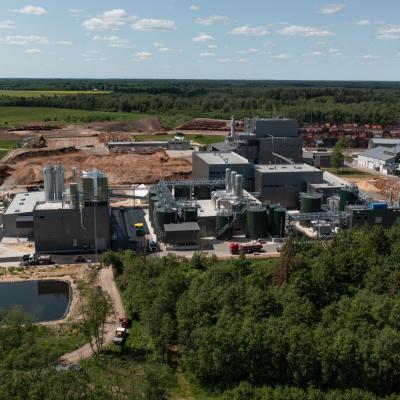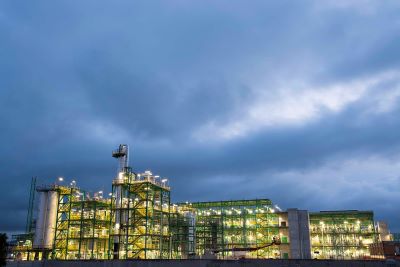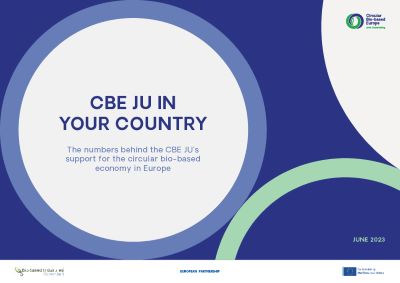
In yesterday’s State of the Union address, President of the European Commission Ursula von der Leyen highlighted competitiveness, industrial modernisation, and nature preservation, among other European Commission achievements over the past year. CBE JU has contributed to these accomplishments by stimulating Europe’s industrial leadership, boosting innovative technological development and decarbonising the economy, among others. Today, CBE JU published a new set of infographics showing the joint undertaking’s support for the circular bio-based economy in each European country.
Green industry: competitive and reconciled with nature
During the State of the Union address, the European Commission’s President emphasised the strong bond between competitiveness and sustainability for Europe’s industry. The EU’s economic agenda lies at the heart of the European Green Deal, which is ‘the centrepiece of our economy and is unmatched in ambition’. In von der Leyen’s words, ‘the European Green Deal was born out of this necessity to protect our planet. But it was also designed as an opportunity to preserve our future prosperity.’
Europe's industry is showing every day that it is ready to power this transition. Proving that modernisation and decarbonisation can go hand in hand.
Ursula von der Leyen, President of the European Commission
With more than 160 funded projects, the CBE JU has contributed significantly to the development of the circular bio-based economy in Europe, aiming to reconcile industrial modernisation and decarbonisation. The Commission’s President highlighted that ‘Europe's industry is showing every day that it is ready to power this transition’, as shown by the CBE JU achievement and impacts so far.

Stimulating competitiveness and economic growth
Key priority areas in which the CBE JU has made a significant contribution to achieving EU objectives are competitiveness and industrial policy.
Among other projects, CBE JU is funding the construction of 14 highly innovative first-of-their-kind industrial-scale biorefineries, which contribute to the EU's economy, technological leadership, and sustainability targets. Such flagship projects have been implemented across Europe, from Estonia, where the SWEETWOODS project has built a first-of-its-kind facility to produce sustainable bio-based chemicals, to Spain, where the CIRCULAR BIOCARBON project has established an innovative biorefinery to produce bio-based materials from the organic fraction of municipal solid waste.
Small and medium-sized enterprises (SMEs) are the backbone of the EU economy, representing 99% of all companies in the EU. CBE JU has successfully supported SMEs since its inception. SMEs account for 39% of all participants in CBE JU-funded projects and receive 37% of all allocated funding. More than often, these companies are driving innovation and sustainability in the European bio-based sector.
The public-private partnership model of CBE JU is a source of new revenue streams for the EU priorities. CBE JU has a track record of success in leveraging investment, with each euro of public funding spent on the projects that it supports generating €2.80 in private investment.
Strengthening local economies around Europe
Another aspect in which the CBE JU reinforces the EU’s industrial competitiveness is reducing its dependence on strategic imports and creating local supply chains. Projects helping to achieve this goal include the FARMŸNG project, which has built a first-of-its-kind biorefinery near Amiens, France, to produce much-needed protein for animal feed from mealworms, and the Austrian-led SUSFERT project, which will bring to the market bio-based fertilisers to diminish EU’s reliance on rock phosphate imports.
The revitalisation of rural economies and regions by strengthening and diversifying local supply chains is an additional example of how the CBE JU boosts EU competitiveness. On the Italian island of Sardinia, the FIRST2RUN project works with local farmers to obtain sustainable biomass in the shape of vegetable oils from underutilised crops for its flagship biorefinery. The oils are turned into products such as compostable coffee pods, polyester, cosmetics and plastics.
Such examples highlight the potential of CBE JU-funded projects to diversify the income streams of primary producers, such as farmers, create highly skilled green jobs, and ultimately boost local economies.
Helping to reach the European Green Deal targets
Activities funded by the CBE JU support the transition to a low-carbon economy through the creation of a sustainable and circular bioeconomy based on renewable resources. In this regard, they will prove instrumental in achieving the European Green Deal objectives of transforming the EU into a modern, resource-efficient, and competitive economy and making Europe the world’s first climate-neutral continent by 2050.
In terms of circularity, CBE JU-funded projects are having a considerable impact on waste reduction. At its two flagship biorefineries, in Zaragoza, Spain, and Sesto San Giovanni, Italy, CIRCULAR BIOCARBON creates materials for cutting-edge technologies like night vision cameras and telecommunications devices from organic municipal waste.
Regarding sustainability, projects are driving the transition from fossil-based resources. SWEETWOODS has built a biorefinery in Imavere, Estonia, where lignin and sugars are extracted from waste wood chips. The lignin can replace fossil-based chemicals in products such as packaging, construction materials, cosmetics and asphalt.
Better skills for future prosperity
Shortage of relevant skills was also identified by the Commission’s President as ‘one of the most significant bottlenecks for our competitiveness, because [they] hamper the capacity for innovation, growth and prosperity.’ To boost the skills in the sustainable construction sector, the CBE JU currently has an open call for project proposals for supporting activities for the New European Bauhaus Academy, a network for re-skilling and upskilling towards a sustainable construction ecosystem.
CBE JU in your country
To easily show the EU's support for the circular bio-based economy in European countries, the CBE JU has released a set of infographics that provide a detailed overview of their funded projects in each country. These infographics offer valuable insights into the funding received, the types of beneficiaries, and the funding of small businesses in these projects. Additionally, they showcase the demonstration plants and flagship biorefineries per country. These infographics are now available.





